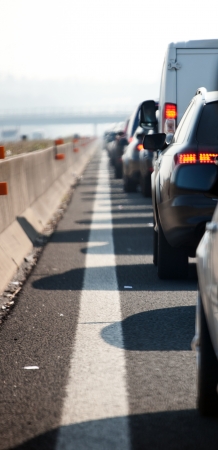Rubbernecking Causes Accidents
May 8, 2017 | Category: Automobile Accidents, Personal Injury, Wrongful Death | ShareA natural reaction whenever there is a vehicle accident is for others to slow down to see what happened and whether anyone was hurt and needs help. The official term for this slow-down is “rubbernecking.” Wikipedia says rubbernecking is “the act of staring at something of interest and says the word refers to the physical act of craning one’s neck in order to get a better view.”
Rubbernecking does more than cause minor traffic delays; it can actually cause other vehicle accidents.
The Dallas News reported in February on the death of a 75-year-old author in Waco, Texas. The death, authorities believed, was the result of drivers trying to take photos and videos of a rollover crash on the interstate. The author’s death happened after the vehicle in which she was riding was involved in a collision with two other vehicles and a semi-truck.
How does rubbernecking cause accidents?
 A study conducted by Virginia Commonwealth University reported in the Journal of Transportation in 2014 indicated that the act of rubbernecking was the main cause of accidents that involved distracted driving, and that statistic has not shifted much in the last decade.
A study conducted by Virginia Commonwealth University reported in the Journal of Transportation in 2014 indicated that the act of rubbernecking was the main cause of accidents that involved distracted driving, and that statistic has not shifted much in the last decade.
Rubbernecking is distracted driving.
The AAA Foundation (American Automobile Association) says that drivers may not think about it, but the curiosity about what may be happening ahead or on the other side of the road is just another form of distracted driving just like eating, texting or trying to read a map while driving. The act of staring at an accident is taking the driver’s eyes off the road. The foundation further says:
Rubbernecking increases the chance of rear-ending another car. Distracted drivers often swerve into another lane or even oncoming traffic. Looking at an accident scene instead of directly in front may cause a driver to miss traffic directions from police or other emergency personnel. Rubbernecking causes traffic to back up as curious people slow down to see what is going on.
Are incident screens the answer?
In England, as part of an effort to keep drivers’ eyes on the road and feet on the gas pedal, the government is already investing in incident screens to block drivers’ wandering eyes. The idea is that employing “nothing to see here” screens will lead fewer drivers to slow down to look, and traffic will keep moving while emergency response crews minister to those involved in the accident.
In 2015, a study conducted by a group of psychological scientists from the University of Central Florida put this idea to the test and found that completely obscuring the scene with a barrier drastically reduced drivers’ glances to the side of the road. In the U.S., local police departments are starting to invest in screens manufactured by a company called Stop Rubbernecking, LLC.
“Rubbernecking is a dangerous, distractive activity. If you or a loved one has been injured in an accident involving a driver who was rubbernecking, contact the experienced attorneys at Spivey Law Firm, Personal Injury Attorneys, P.A.,” said Randall Spivey, Fort Myers Car Accident Attorney.
Fort Myers Car Accident Attorney,Randall L. Spivey is a Board Certified Trial Attorney – the highest recognition for competence bestowed by the Florida Bar and a distinction earned by just one (1%) percent of Florida attorneys. He has handled over 2,000 personal injury and wrongful death cases throughout Florida. For a free and confidential consultation to discuss your legal rights, contact the Spivey Law Firm, Personal Injury Attorneys, P.A., in Lee County at 239.337.7483 or toll free at 1.888.477.4839, or by email to Randall@SpiveyLaw.com. Visit SpiveyLaw.com for more information. You can contact Spivey Law Firm, Personal Injury Attorneys, P.A.in Charlotte County at 941.764.7748 and in Collier County 239.793.7748.

